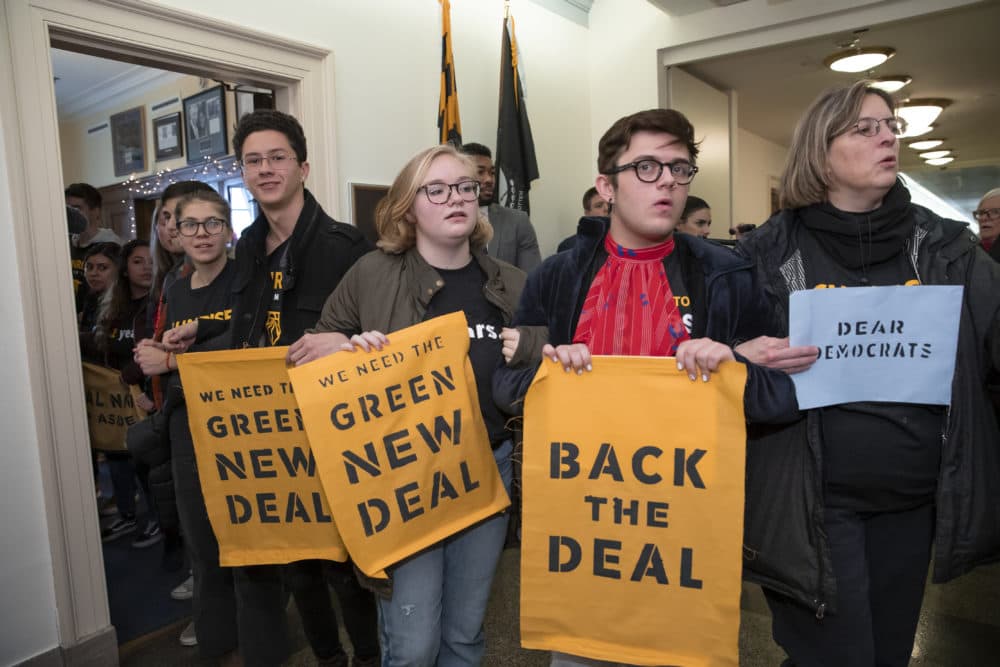Advertisement
Commentary
The Green New Deal Is Radical — And Necessary

Imagine a reboot of the U.S. economy — an unprecedented investment in green infrastructure combined with new social programs to address inequality, and an audacious industrial policy to accelerate a transition to carbon-neutral energy.
That vision of deep decarbonization tied to a generous ration of environmental justice forms the basis of the much-talked-about economic program known as the Green New Deal.
Over the past decade, several versions of a “Green New Deal” have appeared, the most recent of which came out of the youth-led Sunrise Movement. In the new Congress, it has gained a handful of vocal advocates including New York’s charismatic new Congressmember, Alexandria Ocasio-Cortez, as well as Boston’s Congresswoman Ayanna Pressley. And a recent endorsement from newly-announced 2020 presidential candidate Elizabeth Warren has helped to move the idea off the fringes and into the mainstream of climate politics.
With its goal of phasing out fossil fuels before the middle of the century, the program is bold enough to make a difference.
Its supporters are quick to acknowledge that the idea is radical in its ambition. According to a white paper released by the think tank Data for Progress, the project is “a transition to the 21st-century economy” and is “looking to transform the economy and the environment in ways that achieve sustainability, equity, justice, freedom and happiness.”
The Green New Deal is the shock-and-awe approach to fighting climate change.
The white paper calls for requiring emission-free passenger vehicles and zero net emissions from new buildings by 2030. Renewable energy would generate all our electricity by 2035. By 2050, the timetable demands that all transportation systems, including aviation, be free from fossil fuels. And there are numerous additional targets for clean air and water, waste reduction, reforestation, public open spaces, wetlands restoration and sustainable farming.
But the decarbonization of the economy is not the whole story. The architects of the Green New Deal insist that environmental and economic justice must go hand in hand with the energy transition.
A working document from Ocasio-Cortez’s website proposes “a job guarantee program to assure a living wage job to every person who wants one,” which would presumably be made possible by the creation of millions of new jobs needed for infrastructure projects. The right to a job is just one example from a Swiss Army knife of protections and benefits the plan would offer, many of which emphasize serving populations who have suffered discrimination and injustice in the past.
The Green New Deal is unabashedly progressive, much like the massive public works legislation that gave it its name — FDR’s New Deal of the 1930s. It does not hinge on technocratic tinkering or laissez-faire market forces, and it runs decidedly counter to the neoliberal doctrine of tax cuts, small government and unfettered capitalism that has dominated global economics since Reagan.
So, the fate of the Green New Deal rests on the premise that the nation will rally to a package of legislation that could make the Affordable Care Act look like a municipal parking ordinance. That’s a heavy political lift, but the plan has some attributes that could make it viable.
Advertisement
With its goal of phasing out fossil fuels before the middle of the century, the program is bold enough to make a difference. The crescendo of wildfires, extreme storms, melting ice sheets and spreading disease during the past year has stoked demand for taking meaningful action against climate change. With a growing segment of the public frustrated by dithering and inaction on climate at the federal level, the aspirational breadth of the plan could be a potent political asset.
The narrative of [the Green New Deal] must also be about shared prosperity and economic security.
But the urgency of the climate crisis alone has never generated a groundswell of political support for sweeping new programs. People place their immediate self-interest above concern for the planet. Consequently, the Green New Deal must offer more than a solution to the carbon conundrum. Its narrative must also be about shared prosperity and economic security.
Along with the definite gains in public health to be had when we stop burning fossil fuels, the benefits of the economic stimulus should be compelling. The program would put people to work building solar installations and wind farms, insulating buildings, developing carbon-free transportation, making cities climate-resilient, modernizing the electric grid, and working in sustainable agriculture and forestry.
The promise of a living wage job could help the program gain traction, just as protections for pre-existing conditions enabled the Affordable Care Act to establish a loyal constituency.
But the Green New Deal is germinating in a poisoned political landscape where any unorthodox idea can quickly perish in a hail of partisan spite and dogmatic obstinacy. Within the Democratic Party, the response has been mixed, and conservatives are already calling it socialist despotism. Regardless of how much of it survives the inevitable onslaught from the right, the Green New Deal will be important because it sets the baseline against which other climate measures will be judged.
Any competing proposals for climate action that do not prescribe a complete, just and rapid transition to clean energy must be seen as coming up short.
